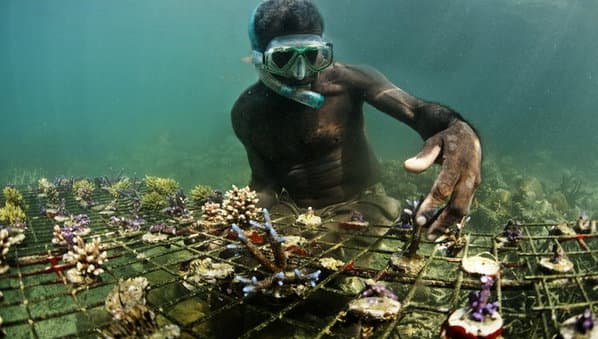Laws to Protect Marine Resources still a long way off

Image credit: James Morgan/Panos
Source: SciDevNet
Legislation to protect ocean areas beyond national borders is moving dangerously slowly, a summit on ocean resources has heard.
The meeting heard that many oceanic resources, such as fish stocks, minerals and coral reefs, need to be legally protected as soon as possible.
Marine resources in many areas are covered by UN convention on the law of the sea, but this does not contain provision for resources in sea areas beyond national jurisdictions, commonly called the high seas.
Because of this, such resources are especially vulnerable to exploitation as they are not governed by specific laws, participants heard.
Concerns were also raised that developing countries could miss out on resources from the deep ocean as this area is often only accessible to nations with advanced — and damaging — extraction technologies. The summit by the UN’s Food and Agriculture Organization (FAO) ran from 17 to 20 February in Rome, Italy.
There has been some progress on the issue, with the UN-established International Seabed Authority granting at least 26 deep sea mineral prospecting licences to seven countries in 2014.
“Nations are increasingly aware of the role they play in managing the high seas as stewards of the oceans.”
Biliana Cicin-Sain, Global Ocean Forum
The process to determine whether it would be helpful to create a broader protective law for the high seas started last month under the coordination of the Global Environmental Facility (GEF), an independent partnership that addresses environmental issues. To begin this process, GEF has created a committee to assess the need for such a framework and what it might cover.
But this committee is not expected to make recommendations until the end of 2017. Only then will the UN decide, sometime in 2018, whether it wants to formally start developing a legal framework.
“This is despite the fact that in documents the language is always ‘urgent, urgent, urgent’,” says Liesbeth Lijnzaad, a representative for the Netherlands in cases before the International Tribunal for the Law of the Sea. “This is a bit off, if it then takes you a decade to go through a process to create an international legal instrument.”
The decline of ecosystems in ocean waters beyond national borders disproportionately affects small island states, whose marine biodiversity depends on healthy open seas, the conference heard. According to the FAO, around 300 million people depend on the high seas for their livelihood, and protecting these resources is part of the draft Sustainable Development Goals.
